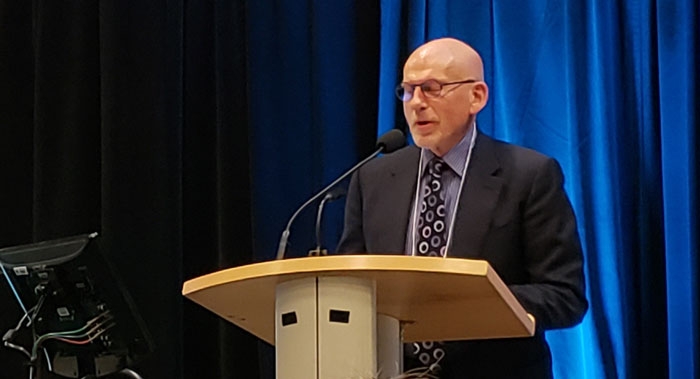
Features
Bioeconomy
Research & Innovation
Growing the forest bioeconomy: biomaterials for high-tech applications
April 25, 2019 – British Columbia’s forest resources and fibre supply have supported the province’s economy and Canada’s GDP for decades.
April 25, 2019 By FPInnovations

Although these resources have provided the province with natural advantages, relying on conventional products such as lumber, pulp and paper alone will not ensure the long-term success of the forest sector. Shifting global markets present opportunities for B.C.’s forest industry to offer next-generation forest bioproducts to advance a cleaner and more sustainable economy.
Convinced of the opportunity of building B.C.’s bioeconomy, the province’s ministry of forests, lands, natural resource operations and rural development (FLNRORD) and FPInnovations have been actively collaborating with academia and industry partners through B.C.’s Bioproduct Alliance (BioAlliance) in an effort to diversify the forest sector and lead it into the globally emerging bioeconomy. “B.C. has great potential to develop high-tech applications and sustainably utilize its natural resources to create novel products needed in the market,” says Wadood Hamad, science manager for the Transformation & Interfaces Group – Bioproducts at FPInnovations. “Our goal is to advance and establish B.C.’s bioeconomy through an evidence-based, scientific approach.”
The two partners have focused on developing a platform and roadmap for using bio-sourced materials for high-technology applications. With an estimated 3.6 million oven-dried tonnes of recoverable post-harvest residual biomass in B.C., prospects for developing and commercializing new products from fibre waste are exciting. Sustainably managed and renewable forest biomass has the potential to provide more environmentally friendly bio-derived products and materials than conventional products derived from fossil fuels.
On March 11, 2019, a one-day symposium – hosted by FLNRORD and FPInnovations, supported by the Ministry of Jobs, Trade and Technology (JTT), VTT Technical Research Centre of Finland (VTT), Innovate BC, and the BC BioAlliance – was held in Vancouver to grow awareness on the abundant potential of using bio-sourced materials for high-value and high-tech products. The symposium, “Growing the Bioeconomy: Bio-Sourced Materials for High Tech Applications,” used the co-located BCTECH Summit as a platform to bring together key players from industry, government and research organizations from within B.C., Canada and Europe. Key attendees included Bruce Ralston, minister of jobs, trade and technology, John Allan, deputy minister of FLNRORD, and representatives from multiple First Nations in the province.
During his opening remarks, John Allan clearly expressed the importance of creating new opportunities that will benefit the long-term competitiveness and success of the forest sector and, consequently, benefit the local and national economies. “Developing a forest bioeconomy will enable more processing and manufacturing of forest biomass to ensure we are capturing the most value from forest resources,” he said. “This will in turn create a more competitive industry, more resilient communities through job creation in urban, rural and Indigenous communities, and a more sustainable future for the province.”
A well-rounded group of experts from FPInnovations, VTT, academia and industry provided a glimpse of the high-tech applications using bio-based materials that have already been implemented or are in development. Quite possibly the highlight of the day were two interactive panel sessions. The first panel explored the research and development of bio-sourced materials, focusing on the many opportunities and challenges surrounding the commercialization of products. The second panel, composed of well-known executives in the industry, discussed opportunities and challenges in the manufacturing of high-tech materials using bio-sourced components.
Throughout the symposium, attendees had the opportunity to view 3D printing demonstrations using innovative methods and materials from universities in B.C.’s Lower Mainland. Additive manufacturing, or 3D printing, is a technology with potential to revolutionize manufacturing, enabling custom parts to be made on-demand and eliminating huge capital costs for machinery and material waste. Relevant to discussions around re-invigorating and growing rural communities, 3D printing is a crucial component of small manufacturing operations proposed for remote areas where bio-sourced printing materials can be obtained from the local environment.
This is the first public forum on the topic of B.C.’s bioeconomy. The intention is to continue to grow and collaborate on biomaterials for high-tech applications, eventually transforming B.C. into an innovation hub in the bioeconomy sector.
More information on the symposium can be obtained by contacting Wadood Hamad, science manager for the Transformation & Interfaces Group – Bioproducts at FPInnovations, at wadood.hamad@fpinnovations.ca.
_____
FPInnovations is a not-for-profit organization that supports the Canadian forest sector’s global competitiveness.
This article originally appeared in the Spring 2019 issue of Pulp & Paper Canada.
Print this page